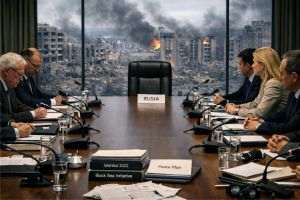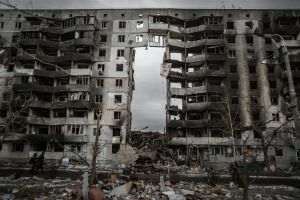The second quarter of 2025 was, for our country, a tense and decisive period, marked by dramatic political transitions, acute budgetary pressures and economic measures with a profound impact. Against the backdrop of a turbulent political climate and persistent budgetary imbalances, the country faced major challenges, but also registered signs of institutional consolidation and fiscal reform. The electoral context dominated the beginning of the quarter, when April was marked by a strategic postponement of unpopular fiscal measures. The presidential elections in May were a major inflection point, culminating in a transition of power that paved the way for a new governing coalition, inaugurated in June. All of this was reflected in the country's economic dynamics, with direct effects on budget execution, monetary policy and investor confidence.
• April: Delayed promises and budgetary pressures in an electoral context
Mid-spring began with an economy under direct pressure from the presidential elections scheduled for May. The necessary measures to reduce the budget deficit were postponed for electoral reasons, and monetary policy remained cautious, with the NBR maintaining the reference interest rate at 6.5%. Despite domestic volatility, April brought positive news on the fiscal front: general consolidated budget expenditures decreased by 1 billion lei compared to April 2024, and revenues increased by 16%, to 59 billion lei. The budget deficit for the first four months was reduced to 2.95% of GDP.
Through an emergency ordinance adopted on April 3, the Government established a differentiated tax rate for special constructions, of 0.5% for those that are not public property and of 0.25% for those concessioned in the public domain. The measure also includes a 10% bonus for early payment until May 25. Facilities were also introduced for the Ministry of National Defense and the education system, with the possibility of hiring seasonal staff and competitions for filling positions in nurseries financed by the PNRR.
Although political decision-makers have stated, both from Victoria Palace and Cotroceni Palace, that there is a need to reduce budget spending, the Government launched several de minimis aid schemes in April. Some of these are addressed to agricultural producers (342 million lei for vegetables in protected areas, 1.5 million lei for farmers raising Bazna and Mangaliţa pigs).
Furthermore, the Government decided to establish a mechanism for granting advantageous loans from the Treasury to local communities that need financing exclusively to carry out European projects. The total amount to be allocated from the state budget amounts to over 1.5 billion lei.
Also in April, a key reform was adopted regarding the corporate governance of public enterprises, imposing stricter selection criteria and increased transparency. The procedures for obtaining construction permits were also simplified, in an effort to boost investment.
The Ministry of Finance managed to mobilize the population through the TEZAUR and FIDELIS bonds, attracting over 8 billion lei by April alone. Interest expenses increased significantly, reaching 20.42 billion lei, and social expenses amounted to 85.62 billion lei. In addition, the need for financing led the Ciolacu government to contract a loan from the International Bank for Reconstruction and Development in April worth approximately 650 million euros, intended to refinance public debt and support fiscal reforms.
• May: Political Earthquake, Economic Stagnation, and Financial Volatility
The presidential elections in May shook traditional hierarchies. Nicuşor Dan's victory over the favorite George Simion in the second round, after a first round dominated by the AUR candidate, was a turning point for Romanian society. The result accelerated a radical political reconfiguration: the resignation of Prime Minister Marcel Ciolacu, where Elena Lasconi resigned, being replaced by Dominic Fritz.
Added to all this was the controversial withdrawal of Călin Georgescu, the symbolic leader of the sovereignist current, whose statements contributed more to the radicalization of public discourse than to national cohesion. His final speech reflected a notable logical dissonance and a self-victimization that only served to underline the failure of a political platform that divided the electorate into two almost equal blocs: pro-Europeans and sovereignists.
Political instability also had repercussions in terms of governance: resignations, interims and transitions at the top of the parties led to increased uncertainty in the implementation of policies, although the president Nicuşor Dan quickly initiated talks to form a pro-European coalition government, with the aim of continuing the reforms undertaken through the PNRR and reducing the budget deficit. Moreover, the polarization between sovereignists and Europeanists reflected a deep rift in society and amplified public distrust in traditional institutions. Scenes of political instability generated a climate of uncertainty, with immediate effects on the markets: depreciation of the leu, increase in government bond yields and capital outflows.
The economy was affected by stagnation, with GDP growing by only 0.2% in the first quarter and a current account deficit that reached 7.6 billion euros. Foreign direct investment decreased and the trade imbalance increased. The budget deficit rose to 3.4% of GDP in the first five months, despite a 14% increase in tax revenues.
In parallel, public investments have seen an important allocation, through the approval of the revenue and expenditure budgets of some strategic state companies: Poşta Română, CFR, CNI, Romtehnica, Loteria Română and the Administration of Maritime Ports. The largest investments approved in May refer to the railway infrastructure (CFR) - over 7.8 billion lei and to the modernization of airport infrastructure, through the allocation of almost 500 million lei from the Government Reserve Fund. The Ministry of Finance also granted state aid of over 1 billion lei for private investments, especially in the chemical, automotive, agri-food and aeronautical industries, which represents a positive signal for the real economy.
The TEZAUR and FIDELIS programs continued to attract interest, with total investments exceeding 22 billion lei in the first five months, a sign that the population still has confidence in state instruments.
Given this macroeconomic and financial situation, the Board of Directors of the National Bank of Romania decided not to change the monetary policy. Thus, in the meeting of April 7, the members of the NBR Board of Directors decided to maintain the reference interest rate at 6.5% and the rates for credit and deposit facilities at 7.5% and 5.5%, respectively.
On the local social and economic level, in the second half of May the disaster at Salina Praid - with major implications for regional employment and tourism - brought to the forefront the vulnerability of critical infrastructures and the lack of coordination between authorities. The intervention of European specialists and the formation of an inter-ministerial committee show, however, an institutional capacity to react.
• June: political cohesion and the first fiscal correction measures
In June, intense negotiations between parliamentary parties led to the formation of a broad pro-European coalition and the inauguration of the Ilie Bolojan government. The new Executive, invested by the Parliament on June 23, started its activity with force: it adopted austerity measures, increased the general VAT from 19% to 21% and increased excise duties, measures intended to stabilize the budget and avoid the risk of insolvency, explicitly warned by the Prime Minister. Previously, the Predoiu government, which was in interim until June 23, continued to allocate significant amounts for local economic support, including for the Praid Salt Mine, seriously affected by the floods. The support granted to Praid was 300 million lei, of which 200 million lei for the extractive and processing industry, and 100 million lei for tourism and food. We recall that the Praid Salt Mine was closed after, following heavy floods, the water of the Corund stream infiltrated the galleries. Specialists sent to the scene, including those sent through the European Civil Protection Mechanism, estimated that between 4 million and 7 million cubic meters of salt water entered the underground, endangering both salt mining and tourism in the Praid Salt Mine.
The interim government also approved 279.1 million lei for the payment of CO2 emission certificates by the Oltenia Energy Complex, and over 9.5 million lei were allocated for the expropriations necessary for the construction of transport infrastructure, including the Botoşani Ring Road and the Sibiu-Piteşti Motorway. In parallel, allocations were approved for additional expropriations regarding the Mediaş bypass, the Bucharest Ring Road, DN7 Bâldana-Titu and the bridge over the Danube in Brăila, totaling over 30 million lei.
The Ministry of Finance managed to raise 1.64 billion lei through Fidelis bonds in June, a clear signal of continued appetite for saving in state instruments. However, economists have warned that such reliance on public financing cannot replace sustainable fiscal consolidation. Also in June, Romania was hit by the temporary suspension of the Junk Program, which led to a 50% collapse in new car sales. In parallel, PNRR funds raised by the end of the month were only 10.72 billion euros, a pace considered slow compared to other countries in the region.
At the end of June, the Bologna government came to the aid of vulnerable consumers as the capping-compensation scheme for electricity bills expires on July 1, 2025. The executive approved the allocation of monthly vouchers worth 50 lei for vulnerable electricity consumers - with an estimated budgetary impact of 1 billion lei - which would benefit approximately 2.5 million citizens. At the same time, the capping of the commercial allowance for basic foodstuffs was extended until September 30, 2025.
A strategic turning point was the NATO decision, adopted at the Hague summit, through which member states, including Romania, commit to allocating 5% of GDP to defense by 2035. This decision requires a rethinking of the public budget and the prioritization of strategic infrastructure. As part of the allied commitment, the Netherlands announced the donation of 18 F-16 aircraft to Romania, which will be integrated into the Feteşti Center.
At the end of the month, the Supreme Council of National Defense decided to include tax evasion in the scope of threats to national security, establishing the intensification of controls and the acceleration of the digitalization of the tax system. The first budgetary measures to limit increases and reduce administrative expenses were also adopted.
In conclusion, at the end of the second quarter of this year, we note that political instability was tempered by the formation of a coalition government and that fiscal measures were initiated with the aim of avoiding a financing crisis. The inflation rate remains high, the economy is stagnating, and social pressures are increasing. However, the reformist direction and political coordination seem to finally provide a framework for rebalancing Romania, provided that the pace of reforms is maintained and supported by political stability and institutional efficiency.

















































